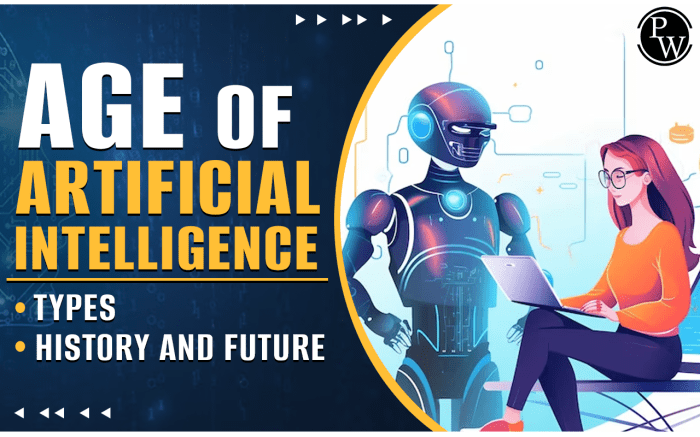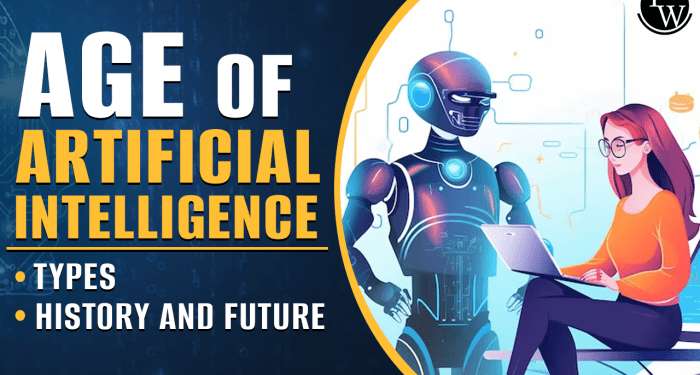Embarking on a journey into the realm of Computer Information Systems in the Age of Artificial Intelligence, this introductory paragraph aims to pique the interest of readers with a glimpse into the evolving landscape of technology. As we delve deeper, the fusion of AI and CIS unveils a world of endless possibilities and challenges waiting to be explored.
Delving into the intricate relationship between AI and CIS, we uncover the transformative power of technology in shaping the future of information systems.
Introduction to Computer Information Systems in the Age of Artificial Intelligence
Computer Information Systems (CIS) refer to the study of how technology can be used to solve business problems and improve the efficiency of operations. On the other hand, Artificial Intelligence (AI) is the simulation of human intelligence processes by machines, especially computer systems.
The integration of AI into CIS is significant as it allows for the automation of tasks that were previously time-consuming and prone to errors when done manually. AI can analyze large sets of data at a speed and scale that surpass human capabilities, leading to more accurate insights and decision-making.With the advent of AI, CIS has evolved to become more efficient and effective in handling complex tasks.
AI-powered systems can now perform tasks such as data analysis, predictive modeling, and natural language processing with a level of sophistication that was previously unimaginable. This evolution has transformed how businesses operate and make use of technology to stay competitive in the digital age.
Applications of Artificial Intelligence in Computer Information Systems
Artificial Intelligence (AI) is revolutionizing data management in Computer Information Systems (CIS) by enhancing efficiency, accuracy, and decision-making processes. By leveraging AI technologies, CIS can handle large volumes of data, identify patterns, and generate valuable insights to drive strategic decisions.
AI-Powered Technologies in CIS
AI-powered technologies such as machine learning algorithms, natural language processing, and predictive analytics are being widely used in CIS. Machine learning algorithms enable CIS to automate tasks, detect anomalies in data, and improve the overall data processing efficiency. Natural language processing allows CIS to understand and interpret human language, facilitating communication with users and extracting valuable information from unstructured data.
Predictive analytics helps CIS forecast trends, anticipate future outcomes, and optimize decision-making processes based on data analysis.
Impact of AI on Decision-Making Processes in CIS
AI has significantly impacted decision-making processes within CIS by providing real-time insights, identifying trends, and predicting outcomes based on data analysis. AI algorithms can analyze vast amounts of data quickly and accurately, enabling CIS to make informed decisions that drive operational efficiency and strategic planning.
By integrating AI technologies, CIS can improve decision-making processes, optimize resource allocation, and enhance overall performance.
Challenges and Opportunities in the Intersection of AI and Computer Information Systems

AI integration in Computer Information Systems presents both challenges and opportunities that organizations need to navigate effectively to leverage the full potential of this technology.
Key Challenges in Implementing AI in CIS
- Integration Complexity: Incorporating AI into existing CIS infrastructure can be complex and requires significant resources and expertise.
- Data Quality and Accessibility: AI systems rely on high-quality, accessible data, which may not always be readily available or easy to collect within CIS environments.
- Ethical and Legal Considerations: The use of AI in CIS raises concerns about data privacy, security, bias, and accountability, requiring organizations to navigate complex ethical and legal frameworks.
- Skills Gap: Organizations may face challenges in finding and retaining talent with the necessary AI skills to effectively implement and manage AI-enabled systems within CIS.
Opportunities for Innovation and Growth with AI Integration
- Enhanced Decision-Making: AI can analyze vast amounts of data quickly and accurately, enabling organizations to make more informed decisions and improve operational efficiency within CIS.
- Automation and Efficiency: AI-powered systems can automate repetitive tasks, streamline processes, and free up human resources to focus on more strategic initiatives in CIS.
- Personalization and Customer Experience: AI enables personalized experiences for users, such as tailored recommendations and services, leading to improved customer satisfaction and loyalty within CIS.
- Predictive Analytics: AI algorithms can forecast trends, identify patterns, and anticipate future events, helping organizations proactively address challenges and seize new opportunities in CIS.
Ethical Considerations in Utilizing Artificial Intelligence in Computer Information Systems

As artificial intelligence continues to revolutionize the field of Computer Information Systems (CIS), it is crucial to address the ethical implications that come with its implementation. Ethical considerations play a significant role in ensuring that AI-driven CIS solutions are developed and utilized responsibly.
Ethical Dilemmas in AI Implementation
When integrating artificial intelligence into CIS, organizations may face ethical dilemmas such as bias in algorithms, privacy concerns, and job displacement. These dilemmas raise questions about fairness, accountability, and the impact of AI on society.
Importance of Ethical AI Practices in CIS
Ethical AI practices are essential in CIS to uphold values such as transparency, fairness, and respect for user privacy. By adhering to ethical guidelines, organizations can build trust with their stakeholders and ensure that AI technologies are used ethically and responsibly.
Ensuring Transparency and Accountability in AI-driven CIS Solutions
- Implementing explainable AI: Organizations should strive to develop AI systems that provide clear explanations for their decisions and actions, promoting transparency and accountability.
- Conducting ethical impact assessments: Before deploying AI solutions, organizations should assess the potential ethical implications and risks associated with their use to mitigate negative consequences.
- Establishing ethical guidelines and governance frameworks: Creating policies and frameworks that govern the development and deployment of AI in CIS can help ensure that ethical standards are upheld throughout the process.
- Engaging with diverse stakeholders: Involving a diverse set of stakeholders, including ethicists, policymakers, and community representatives, can provide valuable perspectives on ethical considerations and help organizations make informed decisions.
Closing Summary
Concluding our discussion on Computer Information Systems in the Age of Artificial Intelligence, we reflect on the dynamic interplay between AI and CIS, highlighting the immense potential for innovation and ethical considerations that pave the way for a technologically advanced future.
Question & Answer Hub
How does AI impact decision-making processes in CIS?
AI enhances decision-making in CIS by providing data-driven insights, improving efficiency, and enabling predictive analytics.
What are the key challenges faced in implementing AI in CIS?
Some challenges include data privacy concerns, integration complexities, and the need for upskilling the workforce to leverage AI technologies effectively.
Why is ethical AI practice essential in CIS?
Ethical AI practices ensure responsible use of technology, safeguarding against biases, discrimination, and unethical decision-making within CIS.











